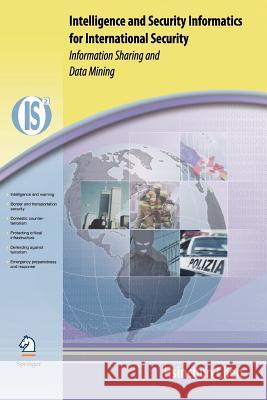Intelligence and Security Informatics for International Security: Information Sharing and Data Mining » książka
Intelligence and Security Informatics for International Security: Information Sharing and Data Mining
ISBN-13: 9781441937339 / Angielski / Miękka / 2011 / 182 str.
Intelligence and Security Informatics for International Security: Information Sharing and Data Mining
ISBN-13: 9781441937339 / Angielski / Miękka / 2011 / 182 str.
(netto: 594,23 VAT: 5%)
Najniższa cena z 30 dni: 597,58
ok. 16-18 dni roboczych.
Darmowa dostawa!
On September 11, 2001 the World became completely cognizant of the security challenges it faces on an international scale. With this awareness a commitment has come from the scientific, engineering, and health communities to help meet the world meet an array of security challenges. From these activities the science of "Intelligence and Security Informatics," is emerging, which will influence a new generation of policy makers, practitioners, researchers, and students. INTELLIGENCE AND SECURITY INFORMATICS FOR INTERNATIONAL SECURITY: Information Sharing and Data Mining presents a systematic national security research framework, and within this context, the book discusses IT technical components, and directions. The book synthesizes the research in the field, focusing on information integration and data mining in particular. Integrated in the discussion are a number of real-world case studies illustrating how security technologies are developed and how they can be applied in critical law enforcement, emergency response, intelligence analysis, and terrorism contexts. The book reflects a decade of leading-edge research on intelligence and security informatics from the Artificial Intelligence Laboratory and the NSF COPLINK Center for Homeland Security Information Technology Research. Working in parallel with the research has been its application in real-world community situations by the center s director and the book s author, Dr. Hsinchun Chen. The book s audience is wide and includes the following: (1) college professors, research scientists, graduate students, and select undergraduate juniors and seniors in computer science, information management, information science, and other related public safety, intelligence analysis, and terrorism research disciplines; (2) researchers, analysts, and policy makers in federal departments, national laboratories, intelligence community, public safety and law enforcement agencies, and the emergency response community; and (3) consultants and practitioners in IT hardware, communication, and software companies, consulting firms, and defence contractors of varying sizes and countries."











